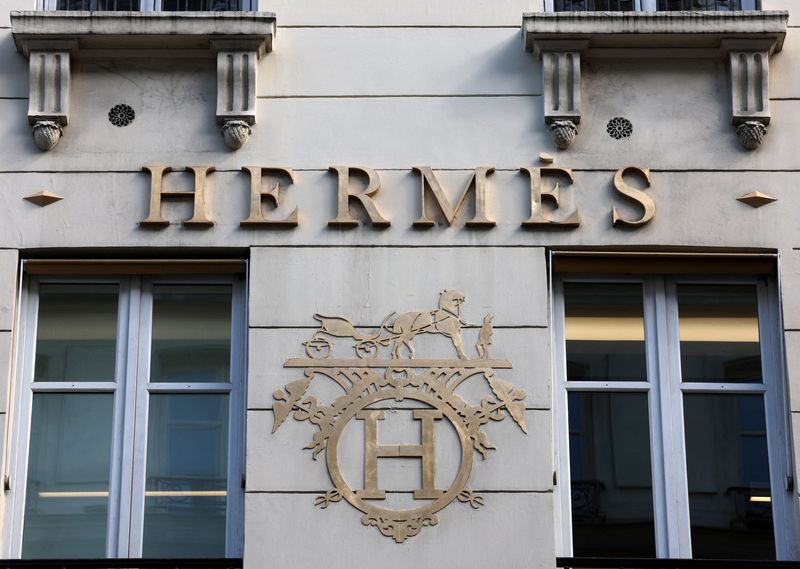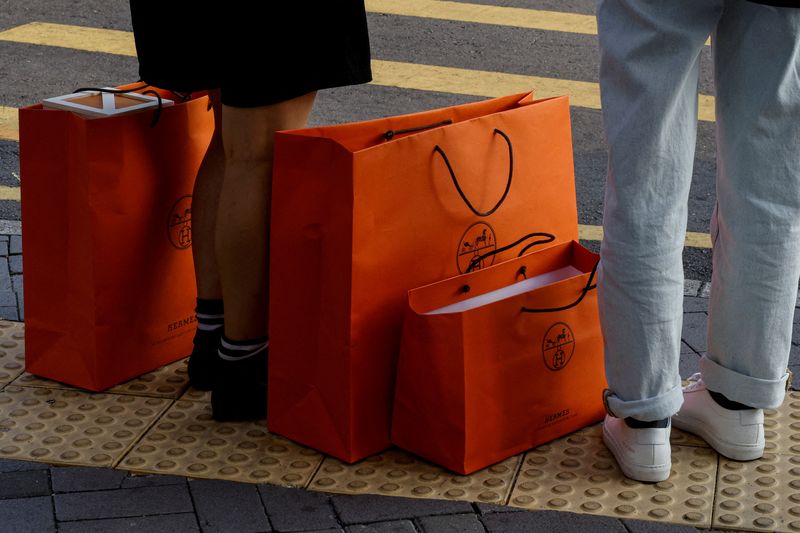By Mimosa Spencer
PARIS (Reuters) - Birkin-bag maker Hermes reported a 13% rise in second-quarter sales on Thursday, demonstrating the continued appetite from wealthy shoppers for its luxury handbags, even as less affluent consumers pull back.
The French group's results stand out after a string of disappointing earnings updates from rivals - including Kering (EPA:PRTP) and LVMH - which have raised investor concern about uncertain prospects for the sector in the coming months.
Hermes' famously classic designs and tight management of production and stock have helped reinforce the label's aura of exclusivity and made the company one of the most consistent performers in the industry.
CEO Axel Dumas told reporters the company had seen "no big interruption in trends".
"Iconic categories like leather goods continue to drive growth," said Luca Solca, analyst at Bernstein, referring to the 17.9% growth in the company's largest division, leather goods.
But Dumas said Hermes was seeing slightly less traffic with aspirational clients, which was impacting higher volume products like fashion accessories, including silk scarves.
That pushed sales in the group's smaller silk and textiles division down 5.6% during the quarter.
Total sales at the French luxury group grew to 3.7 billion euros ($4.02 billion), a 13% organic sales increase that strips out currency fluctuations. The figure was in line with analyst expectations, according to a Visible Alpha consensus.
Operating profit for the first half was 3.1 billion euros, compared with a forecast from consensus provider Visible Alpha for 3.2 billion.
Sales in Asia Pacific, excluding Japan, grew 5.5% during the quarter, while Japan jumped 19.5%, it said.
European luxury brands are benefiting from a surge of luxury sales in Japan, where tourists -- especially Chinese -- are taking advantage of the weak yen.
In China, a property crisis and job insecurity are weighing on the economy, which has hit demand for luxury goods after the country's post-pandemic lockdown bounce tapered off a year ago.
Dumas said that the company's Chinese clientele continued to purchase at home, and unlike peers, business in Japan was mainly driven by locals, not tourists.
He added that Chinese clients are currently looking for high-quality products, "not necessarily with logos", a change that will benefit the group.
Consultancy Bain said last month that a preference for more discreet fashion was emerging in China as the country's rich sought to avoid flaunting their wealth at a time of economic austerity.
Dumas also pointed to a dynamic U.S. market, describing it as a "great surprise". Sales in the Americas jumped 13% year-on-year in the second quarter, accelerating from growth of 11.8% in the first three months.
Hermes shares have risen nearly 6% since the start of the year, bucking a broader trend across the sector.
LVMH shares have lost nearly 10%, while Gucci-owner Kering has lost nearly 30% of its value.

LVMH earlier this week missed quarterly results expectations while Kering also undershot forecasts. Kering said worsening sales trends in June were continuing in July.
($1 = 0.9209 euros)
